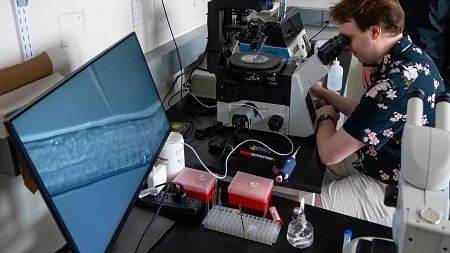University of Oregon Develops Cutting-Edge Solutions for Aging-Related Problems
Around the world people are living longer, and that presents a looming health crisis. Age related health problems—Alzheimer’s disease, osteoarthritis, dementia, and more—are also expected to grow.
“Across the globe, we’re living longer lives, but not better lives,” says Patrick Phillips, a biology professor at the University of Oregon. “The health challenges associated with aging represent a critical problem.”
Phillips is spearheading a new research initiative focused on age-related diseases. The effort employs technology that will accelerate discovery and fuel new approaches to research.
Launched with a major gift from longtime UO donors Kenda and Kenneth Singer, the synthetic biology and aging initiative will leverage the UO’s strengths in the life sciences and unite researchers from different disciplines to study age-related disease.
While conventional medicine often addresses the symptoms of disease, UO researchers will study root causes and how fundamental human systems break down with age. For example, inflammation serves as an essential immune response, but chronic inflammation is linked to heart disease, cancer, and other ailments.
Ultimately, Phillips hopes to modify how human systems function at the cellular level. It starts with synthetic biology: redesigning how organisms function by tweaking their DNA. Using innovative methods, UO scientists will test thousands of these genetic adjustments at once.
Imagine, says Phillips, a drug that alters the genes of a seventy-year-old to regenerate tissue more like those of a thirty-year-old. This would nip several diseases in the bud—or at least delay their onset.
Phillips concedes aging can’t be stopped. But he hopes we can change how we age and maintain active living—what he calls “health span”—later in life.
His research team has already made C. elegans, a worm as long as a pencil tip, live ten times longer by making a few genetic mutations. Researchers in the Phillips lab specialize in this worm—the team recently discovered a revolutionary method for testing thousands of genetic mutations at once using a single specimen.
For the first phase of the initiative, they’re exploring synthetic circuits: switches engineered in the lab that turn genes on and off, in specific tissues at specific times. Currently they’re studying genes known to control how cells respond to stress.
Starvation, excess heat, and toxins are not good for us. However, Phillips says, turning on the cellular responses that our body uses to manage these and other stressors—when they’re not present—could help us lead longer, healthier lives.
For the next phase, Phillips plans to combine this work with that of scientists at the Phil and Penny Knight Campus for Accelerating Scientific Impact who work with “organoids,” an emerging technology.
Clusters of living cells are extracted from human tissue, grown in the lab, and function much like an organ, enabling researchers to test new treatments. Scientists have created organoids emulating the lung, stomach, heart, liver, pancreas, retina, and kidney.
At the Knight Campus, researchers are already using organoids related to human performance. For example, they’re studying tissue models of the human knee, bone, cartilage, and muscle.
Phillips emphasizes you won’t see little knees kicking around in UO laboratories. They’re microscopic (picture rows of petri dishes). Organoids offer an effective alternative to experimentation on living subjects, and they’re scalable.
Aging is a massive, systemic phenomenon, Phillips says; Studying its root causes will require complex experiments involving organoids, robots to automate procedures, and artificial intelligence to evaluate vast amounts of data.
Researchers in the Phillips lab and Knight Campus will apply discoveries about worm DNA to organoid experiments leading to revelations about age-related disease.
Take Alzheimer’s, for instance. More than six million people in the US have the disease and this number is expected to increase to nearly thirteen million by 2050, according to the Alzheimer’s Association.
Scientists don’t know what causes Alzheimer’s or who’s going to get it. Researchers could use brain organoids to screen drugs, test treatments, and observe how the disease progresses.
Traditional experiments focus on one or two variables, but Phillips envisions “brute force” research in which scientists examine many variables at once. By simultaneously studying thousands of genetic circuits in organoids, he hopes to make discoveries that lead to new therapies.
This potent combination of artificial intelligence, synthetic biology, organoids, and automation will enable scientists to take a more comprehensive approach to exploring—and transforming—how we age. It will also reduce the time between discoveries in the lab and treatments that help people.
It’s a big plan. But Phillips is familiar with thinking big, having served in numerous university leadership roles and nationally, as an expert on aging and genetics with the National Institutes of Health.
Phillips’s research—and its potential—inspired the Singers to invest and launch the initiative.
“For investing and philanthropy, we look for excellent people,” says donor Ken Singer, a retired orthopedic surgeon and team physician for the Ducks for thirty years. “Phillips is a well-regarded scientist who’s done incredible work.”
“I spent much of my time as a physician assistant working with older people,” says donor Kenda Singer, BS ’74 (biology), whose career spans primary care, women’s health, dermatology, and women’s athletics. “This research model holds great promise.”

